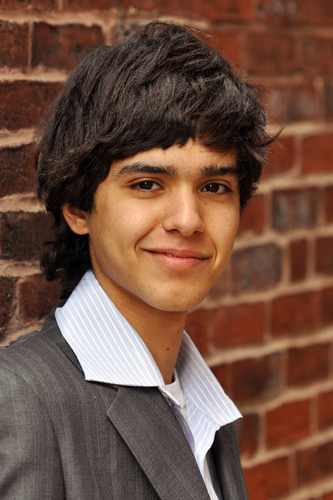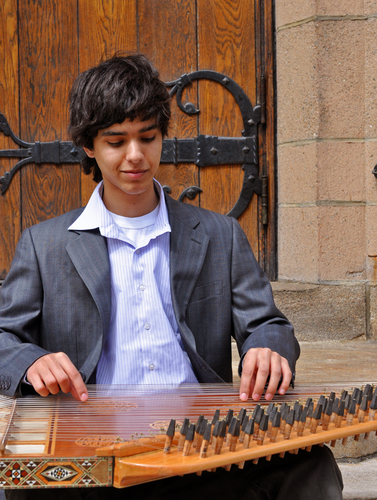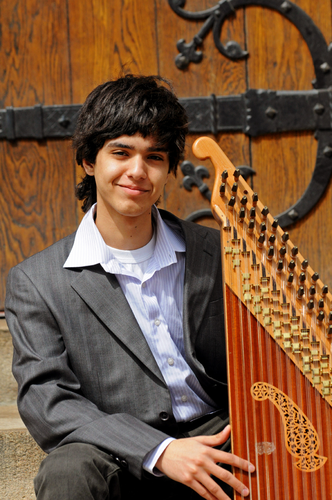Student Profile: Ali Paris

Ali Paris, 18, first semester<br /><strong> Hometown:</strong> Ramallah, West Bank<br /><strong>Major:</strong> Undecided<br /><strong>Instrument:</strong> Voice
Photo by Phil Farnsworth

The <em>qanun</em> has 72 strings and is considered challenging to play.
Photo by Phil Farnsworth

Paris started playing the <em>qanun</em> long before he turned 10.
Photo by Phil Farnsworth
It's a safe bet that most students spent a lot of time practicing before coming to Berklee. Ali Paris, 18, had extra motivation: growing up in the Palestinian territories from the age of 7, sometimes he wasn't allowed outside. Fortunately, his family filled the house with music. It started bearing fruit for Paris early: Arabic/jazz star Simon Shaheen recognized his talent at the age of 10.
Ali Paris's "Al-Jidar" ("The Wall")*
People told Paris to study something practical, but his parents encouraged his dreams. Now, as one of the college's first Palestinian students, Paris feels responsible for setting a positive example and getting the most he can from Berklee. Given the impact he's made in his first semester, that should be no trouble at all.
You're here to study voice, but you also play an Arabic lap harp.
It's called a qanun. It's an Arabic instrument with 72 strings. Each three strings make one note. It's not very common because it's known as a hard instrument. My brother plays violin and my sister sings and plays oud, so the qanun was the choice for me. I studied this instrument back home for 12 years. As time went by I became connected to the qanun and it became a part of my identity.
In your first month at Berklee you played the BPC with an Arabic music master. Did you have a lot of experience on stage?
When I was 7, I started studying music in the only conservatory in Palestine. After that I performed in almost all the cities of Palestine. We went to Dubai to perform, we went to Sweden, we went to Norway. I came to the States for the first time in 2003 and participated in the Arabic Music Retreat in Massachusetts. Three years later, I was picked from my school to perform in the United States, in 13 states in 52 days, with a Palestinian folkloric group, Al-Raja. It's all about showing our different, unique music and telling people that we have musicians in Palestine. We have our culture.
Did you encounter any challenges on the road to Berklee?
It was a very long trip to come here. I don't mean the distance. Just to apply I had a lot of difficulties. There was no audition site in Palestine, and getting into Israel is full of obstacles. There are many checkpoints along the way and then, at the main huge checkpoint between Ramallah and Jerusalem, no one is allowed to pass without permission. I applied many times, but I was never admitted. Finally I contacted Berklee and told them about it. A lot of emails and phone calls, and then I sent them a video of me playing and singing.
Getting accepted was like a dream coming true. But the second difficulty was the visa. We don't have a U.S. Embassy in Palestine. We have to go through the same problem. The first time I asked for permission to visit the embassy in Jerusalem, the answer was "no." They didn't let me in. My dad made some phone calls and told them this is my future—I had to go to the visa interview. It worked. I packed and traveled to Jerusalem where I spent the night to make sure that the next day I would be able to get to the embassy.
What kinds of music do you play?
I really love Arabic music because I think it expresses my feelings more than any other music I play. But I like all kinds of music. That's one of the reasons I'm here, not Tunisia or Egypt. I want to do something special—to mix all this music and add our music to it. Lately I'm trying to play jazz on my qanun. It feels great to have all the prospects opened in front of my eyes. I don't think I would have this experience anywhere else in the world.
What's it like for you here, coming from Ramallah?
I'm the second Palestinian student at Berklee and the youngest. When I got accepted, my family had a big celebration. The president of Palestine, Mahmoud Abbas, knew about it, and I even went to play for him. It was a great opportunity for me to meet him and hear him compliment me and say he was proud of my talent.
One of the reasons that Berklee was interested in accepting me is that I would add something to Berklee. I really want to do that, and not just come here and study and graduate and leave. Today I gave a lesson to a student here. She had a project for her lab, and she wanted to sing an Arabic song. I took my qanun and we practiced. I told her how the lyrics are pronounced and how to sing in the Arabic style. It was a good experience for both of us.
How do you think growing up in the middle of conflict affected your music?
The war, it's the worst thing anyone can have, in all aspects. It made me see and feel things that I wouldn't if I were in any other place. Music was my support through it all. I was really influenced by war to create music, and by music to fight against war. My family and the whole community could not leave their homes for more than a month. Every time our frustration increased, music comforted us. As I was improvising, the machine guns continued my melody. Music helped me absorb the scenes of violence and gave me a space where I could translate negatives into positives. I got used to not having a normal life. Now I enjoy every second of my life as a Berklee student.
You seem to feel like a cultural ambassador.
Along with learning, I'm also representing Palestine. Being a good musician who is able to help people—I represent that Palestinians are a helpful, giving people. We want to overcome war and find peace, I believe. Music is peace.
After I graduate, I want to go back home and add something new and teach students. I want to spread music through every home and every soul. Life back home is kind of empty. I imagine my life like other students without music—sitting for like four hours playing cards. I hope this will change. I hope I'll change this. If people have music institutions to give them the education, they will use their time in more creative ways and more positive ways.
Top 5 Admired and Influential Musicians
- Simon Shaheen
- Asmahan
- Mohammed Abd al-Wahhab
- Fairuz
- Om Kolthoum
